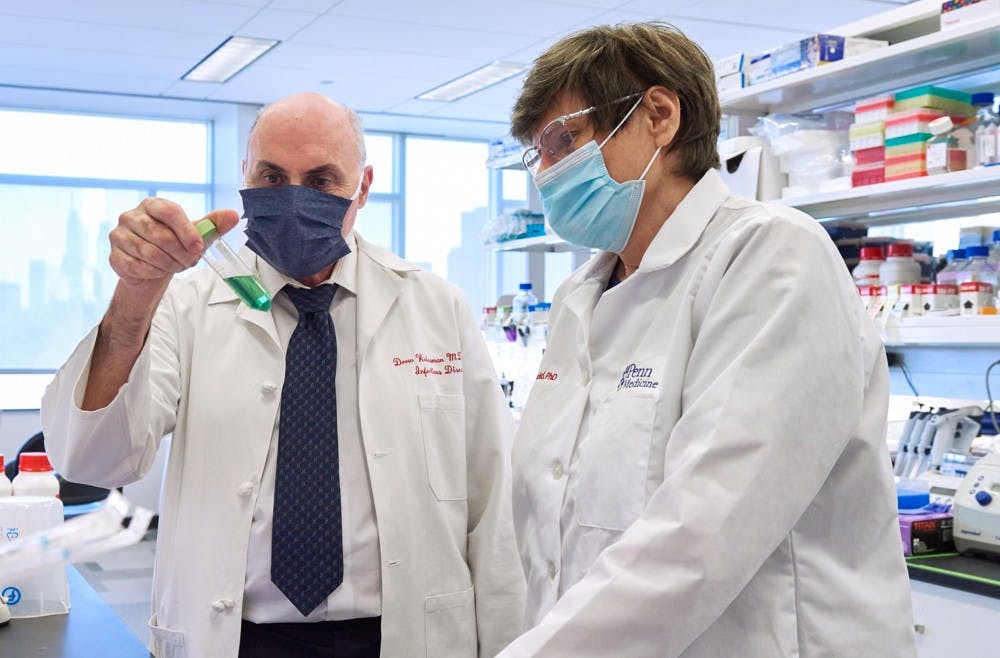
Drew Weissman (left) and Katalin Karikó (right) were inducted into the National Inventors Hall of Fame (Photo from Penn Medicine).
mRNA pioneers Katalin Karikó and Drew Weissman were recently inducted into the National Inventors Hall of Fame.
Karikó, a professor of neurosurgery at Penn, and Weissman, a Roberts Family Professor in Vaccine Research, are well-known for their research into messenger RNA, which heavily contributed to the development of the vaccination for COVID-19. They were inducted into the Hall of Fame alongside 14 other inventors.
Weissman and Karikó first met in 1997 and decided to collaborate after discussing their approaches to vaccine creation. Though the medical community largely disregarded mRNA research at the time, the pair published a paper in 2005 which detailed the potential for mRNA to be used therapeutically. This could be accomplished by surrounding the mRNA in a fat bubble to trigger the immune system while still preserving the genetic code within the mRNA.
Karikó told The Daily Pennsylvanian that she hoped to use mRNA to more efficiently treat certain conditions.
“We discovered that by introducing nucleoside modification in mRNA drugs, we could avoid inflammatory activation,” Karikó said. “The main reason why I was interested in mRNA was because I wanted to develop messenger RNA to therapeutically treat patients who had strokes and other diseases, without causing inflammation."
Their groundbreaking research was of far greater use than Weissman and Karikó initially anticipated. The development of an mRNA vaccine is more efficient than an influenza vaccine and requires just the genetic sequence of the virus for the formulation of its composition. It was therefore used in the rollout of COVID-19 vaccinations by both Pfizer and Moderna.
Weissman previously told the DP of his hopes for further mRNA vaccination development.
“[mRNA research] has enormous potential for vaccines, therapy, and gene therapy,” Weissman said. “It can be applied to many diseases and will likely be found to be better than current approaches.”
Pfizer partnered with BioNTech, Karikó’s current place of work, in the development of the vaccine. Karikó cited the prevalence and importance of community within the medical industry, as well as the work of predecessors.
“There were decades of work prior to that [their discovery] in many fields — virology, the technology of mRNA vaccines, immunology, and so on,” Karikó said. “Everybody contributed to our discovery.”
Karikó and Weissman have received several letters of thanks from people around the world for their contribution to the vaccine, and have received numerous awards for their work, including being named Heroes of the Year by Time Magazine, as well as receiving the Horwitz Prize for Pioneering Research and the Jessie Stevenson Kovalenko Medal.
They were inducted into the Hall of Fame alongside a number of inventors, such as CRISPR technology pioneers Jennifer Doudna and Emmanuelle Charpentier; Marjorie Joyner, the inventor of the permanent wave machine; and James Parsons Jr., the creator of the Durimet 20 stainless steel alloy.
Past inductees include Thomas Edison, Alfred Nobel, the Wright brothers, and Louis Pasteur.
Karikó said it was an honor to be inducted into the Hall of Fame.
“I was looking at those who were inducted to the Hall of Fame before us and I saw the names of many famous people,” Karikó said. “This made me think, ‘Oh my God, me too!’ It is unbelievable. I am humbled and honored to be inducted to the National Inventors Hall of Fame.”
The Daily Pennsylvanian is an independent, student-run newspaper. Please consider making a donation to support the coverage that shapes the University. Your generosity ensures a future of strong journalism at Penn.
Donate






